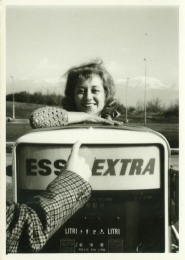Lucia Marcucci
Since the 1960s, Lucia Marcucci has been committed to denouncing the condition of women and the commodification of their bodies. She analyses the mutation of language and its ambiguity in collages of words and images taken from the world of mass communication, as is evident in the ironic representation of the Ragazza Squillo (Call girl), present in the collection: a young woman dressed in all her finery who holds up the famous metal telephone sign with its rotating wheel. From the same series Pin Up are La regina di Saba (The Queen of Sheba) and Essa Extra. All the photographs were taken during a group trip from Rome to Naples with other visual poets.
The famous image of the assassination of J. F. Kennedy in Dallas, seen as if through the viewfinder of the gun that fired the fatal bullet. The colour photograph, taken from a newspaper, is used for a reflection by Lucia Marcucci who composes the collage with the handwritten words “And they lived happily…” half erased with a stroke of a pen, just as the life of the world’s most famous couple was erased by that shot.
LUCIA MARCUCCI is a visual poet, who since the 60s has been an activist for the female condition and against the commercialisation of the female body in contemporary society. She analyses the change of language and its ambiguity in creations realised as collages of words and images taken from the world of mass media. She has a provocative and sacrilegious style. Her art books include Semplice facile divertente (1966); Io ti ex-amo (1970); Libro oggetto (1983). Among the many exhibitions she has taken part to is Libro come luogo di ricerca (Venice Biennale, 1972). She has explored communication mechanisms in the cycle Digital Poems (2010). *She was born in Florence




